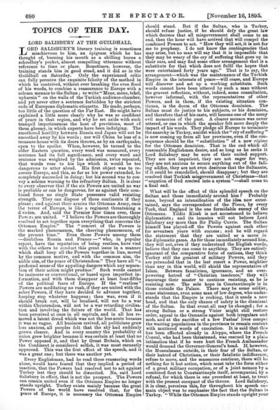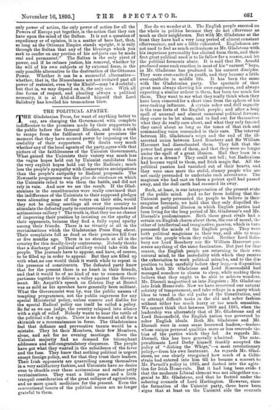TOPICS OF THE DAY.
LORD SALISBURY AT THE GUILDHALL.
TORD SALISBURY'S literary training is sometimes J mischievous to him, an epigram which he has thought of, burning his mouth as a shilling burns a schoolboy's pocket, almost compelling utterance without reference to time or place. Sometimes, however, the training stands him in good stead, and it did so in the Guildhall on Saturday. Only the experienced critic can fully perceive the exquisite felicity of the method in which he contrived, without ever breaking the even flood of his words, to combine a reassurance to Europe with a solemn menace to the Sultan ; to write" Mene, mene, tekel, upharsin" on the walls of the Turkish audience-chamber, and yet never utter a sentence forbidden by the strictest code of European diplomatic etiquette. He made, perhaps, too little of the question of the Far East. He might have explained a little more clearly why he was so confident of peace in that region, and why he set aside with such tranquil imperiousness the host of previsions, most of them gloomy, in which experts have been indulging. The smothered hostility between Russia and Japan will not be smoothed away by his words ; nor will China be less of a treasure-house with its doors thrown, as by an earthquake, open to the spoiler. When, however, he turned to the older Eastern question, every word was measured, every sentence had its full significance, and every word and sentence was weighted by the admission, twice repeated, that words rose to his lips which it would be too dangerous to utter aloud. His first object was to re- assure Europe, and this, so far as his power extended, he completely succeeded in doing; but his second was to con- vey a solemn warning to the refractory Sultan. It is clear to every observer that if the six Powers are united no war is probable or can be dangerous, for as against their com- bined force no single State possesses valid resisting strength. They can dispose of three continents if they please ; and against their armies the Ottoman Army, once the terror of Europe, is like a regiment threatening a d vi:ion. And, said the Premier four times over, these Pow( rs are united. "I believe the Powers are thoroughly resolved to act together upon everything that concerns the Ottoman Empire." The "concert of the Powers is the marked phenomenon, the cheering phenomenon, of the present time." Even those Powers among them —doubtless Russia and France —" who, in popular report, have the reputation of being restless, have vied with the others to conduct this great issue in a manner which shall keep all the Powers together in line, moved by the common motive, and with the common aim, the noble aim, of the peace of Christendom." They have all " profound sense of the appalling dangers which any separa- tion of their action might produce." Such words cannot be insincere or conventional, or based upon imperfect in- formation, and with them disappear at least four-fifths of the political fears of Europe. If the "restless" Powers are meditating no rush, if they are united with the sober Powers, if they have decided to advance together, keeping step whatever happens ; then war, even if it should break out, will be localised, will not be a war within Christendom, will not be a war retarding civilisa- tion and involving the future of the world. That has been perceived at once in all capitals, and in all has re- moved a latent dread which was not the less acute because it was so vague. All business revived, all politicians grew less anxious, all peoples felt that the sky had suddenly grown clearer. And in every country the probability of union grew brighter because it was certain at least that no Power opposed it, and that by Great Britain, which on the Continent is considered selfish, it was most earnestly approved. This was the first effect of the speech, and it was a great one; but there was another yet.
Every Englishman, had he read these reassuring words alone, would have feared that they implied a period of inaction, that the Powers had resolved not to act against Turkey lest they should be disunited. No, said Lord Salisbury in effect, that is not the prospect. The Powers can remain. united even if the Ottoman Empire no longer stands upright. Turkey exists mainly because the great Powers of the world have resolved that, for the peace of Europe, it is necessary the Ottoman Empire should stand. But if the Sultan, who is Turkey, should refuse justice, if he should defy the great law which decrees that all misgovernment shall come to an end, then the hour will have arrived that will compel the combined Powers to act. "How they will act, it is not for me to prophesy. I do not know the contingencies that may arise, but no man will say that it is impossible that they may be weary of the cry of suffering that goes up in their ears, and may find some other arrangement that is a, substitute for that which does not fulfil the hopes that were entertained forty years ago." That is to say, the arrangement—which was the maintenance of the Turkish Empire in the interests of peace—will cease, and Europe will discover and set up a working substitute. Such words cannot have been uttered by such a man without the gravest reflection, without, indeed, some consultation, however informal, with the representatives of other Powers, and in them, if the existing situation con- tinues, is the doom of the Ottoman dominion. The Sultan must do justice to his subjects, or his dominion, and therefore that of his caste, will become one of the many evil memories of the past. A clearer menace was never uttered, or one in which the speaker felt more deeply the impact of his words. They pledge all Europe to terminate the anarchy in Turkey, amidst which the " cry of suffering is now coming up from all her provinces, even if the con- sequence should be the " substitution " of a new regime for the Ottoman dominion. That is the end which all reasonable Englishmen desire, and so long as he seeks it Lord Salisbury may be sure of their united support. They are not impatient, they are not eager for war„ they are not anxious to secure anything out of the fall- ing edifice, they are not even desirous that the Sultanate, if it could be remodelled, should disappear ; but they are resolved that Turkish misgovernment of Christians—that "negation of God erected into a system "—shall come to„ a final end.
What will be the effect of this splendid speech on the Sultan and those immediately around him ? Probably none, beyond an intensification of the idea now enter- tained, says the correspondent of the Times, by every Turk, that England is the one formidable enemy of the Ottomans. Yildiz Kiosk is not accustomed to believe diplomatists ; and its inmates will not believe Lord Salisbury any more than Sir Philip Currie. The Sultan himself has played-off the Powers against each other for seventeen years with success ; and he will regard the statement that they are united as a move in the diplomatic game. As for those immediately around him, they will not, even if they understand the English words, believe that they can come to anything. They are entirely ignorant of the comparative force of nations, they think Turkey still the greatest of military Powers, and they are persuaded that in the last resort a Power, mightier than any in this world, will shield the representative of Islam. Between fanaticism, ignorance, and an over- powering hatred of "Christian insolence," they will encourage their master to continue resisting, as he ie resisting now. The sole hope in Constantinople is in those outside the Palace. There may be some soldier, some statesman, even some man of low degree, who under- stands that the Empire is rocking, that it needs a new head, and that the only chance of safety is the dismissal of the Sultan. In that event all may be changed ; for a. strong Sultan or a strong Vizier might still restore order, appeal to the Osmanlis against both irregulars and mob, and at the sacrifice of a few Pashas' lives compel the warring populations in the provinces to remain content with muttered words of execration. It is said that thie has been effected already in Aleppo, where the French Consul, who had been threatened, was rescued by a plaia intimation that if he were hurt the French Ambassador would demand the Governor-General's head. If, however, the Mussulmans outside, in their fear of the Sultan, or their hatred of Christians, or their fatalistic indifference, refuse to move, and the massacres continue, there will be nothing for it but action, which must take the form either of a great military occupation, or of a joint menace 17 a, combined fleet to Constantinople itself, accompanisel by a. refusal, for which there is one precedent at least, to treat with the present occupant of the throne. Lord Salisbury, it is clear, perceives this, for throughout his speech one main object was to emphasise the fact that the Sultan is Turkey. "While the Ottoman Empire stands upright your only power of action, the only power of action for all the Powers of Europe put together, is the action that they can have upon the mind of the Sultan. It is not a question of expediency or of opinion, it is a matter of bare fact, that, so long as the Ottoman Empire stands upright, it is only through the Sultan that any of the blessings which you seek to confer on any portion of his subjects can be made real and permanent." The Sultan is the only pivot of power, and if he refuses justice, his removal, whether by the will of his own subjects or by external force, is the only possible alternative to the destruction of the Ottoman Power. Whether it can be a successful alternative— whether, that is, the Mussulmans are not irritated past all power of restraint, even by the Khalif—may to doubtful ; but that is, we may depend on it, the only one. With all due forms of respect, and pleading always a political necessity, it is at Abd-ul-Hamid himself that Lord Salisbury has levelled his tremendous blow.



















































 Previous page
Previous page